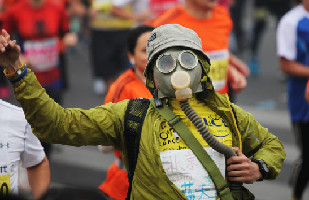Intense air pollution is expected to strike China's northern cities twice more before November.
Smog of moderate and intense levels settled in on Wednesday evening and will last until Saturday in the Beijing-Tianjin-Hebei region, the National Meteorological Center predicted on Tuesday.
During that period, visibility will fall to 2 to 6 km. A forthcoming thick fog in some parts of the region may cut it to less than 500meters.
The second period of heavy smog will be around Oct 28.
October this year will have had four periods of hazardous smoggy weather. Both the smog's intensity and frequency are rare for the area at this time of year.
Cities in the Beijing-Tianjin-Hebei region have seen intense air pollution twice earlier this month, from Oct 7 to Oct 11 and from Friday to Monday.
During that time, the capital had heavy smog for seven days, already four days more than the same period last year.
Ma Xuekuan, chief weather forecaster of the National Meteorological Center, said October is when smoggy weather often happens.
"But it is very rare to see this high intensity of smog," Ma said.
He said the main cause of all the recent smog is that cold air and wind, which can help disperse pollution, have been less frequent and weak in October.
"Under stable meteorological conditions, fog and haze usually occur because there's no cold air or wind, "he said.
The Beijing-Tianjin-Hebei region has had five days of no cold air and wind since the beginning of October - one day more than the same period in recent years.
The average wind speed has also fallen. In Beijing, it is now 5.4 km per hour, 1km/hour less than usual for this time of year.
Pollutants can easily accumulate when the wind speed is slower than 7km/h.
The burning of straw in some parts of the region may also have contributed to the smog's formation, although it is not a primary cause.
Ma said fog is formed by tiny drops of water, and haze is mainly caused by particles of pollutants in the air. High air humidity in recent days may have resulted in the high intensity of smog and poor visibility.
The topography of the Beijing-Tianjin-Hebei region also plays a role in forming smog.
The region is neighbored by Taihang Mountain to the west and the Yanshan Mountains to the north. Local generated pollutants and inflows can easily accumulate in areas near the mountains and cause the intense air pollution, Ma said.
Hua Cong, an expert in charge of environmental prediction at the National Meteorological Information Center, said with the end of summer, rain that can help remove air pollutants to an extent has gradually fallen. In addition, lower temperatures in autumn have cooled the activity of the atmospheric boundary layer, which can speed up the accumulation of water droplets and particle matter.
During the imminent smoggy weather, the concentration of PM2.5 in the Beijing-Tianjin-Hebei region will be around 150 micrograms per cubic meter.
PM2.5, which is particulate matter smaller than 2.5 micrometers in diameter, is small enough to enter humans' lungs and blood-streams, and is not easily discharged from bodies.
It can affect the gas exchange in the lungs and thus may cause diseases such as asthma, bronchitis and cardiovascular disorders.
The public should try to avoid outdoor activities and wear masks when going outside. Drivers should reduce their vehicles' speed under poor visibility conditions, Hua said.
The public should make an effort to protect themselves during the frequent smoggy weather, Ma said.
A Beijing netizen going by the name of Baixue said in a comment on the analysis that smog has been a stubborn problem in recent years, but its causes are still a mystery. The causes are believed to include less wind, automobile emissions, industrial pollutants, and coal and straw burning.
"If we don't narrow down the main causes, how can we deal with it?" Baixue asked.
Zhuanglilaofeng, a netizen from Shijiazhuang, Hebei's provincial capital, said it is a long-term task for the government to finish, and "we should wait with patience and do our part at the same time".
 |
 |
| Beijing Marathon kicks off in haze | Smog affects tours to China |
